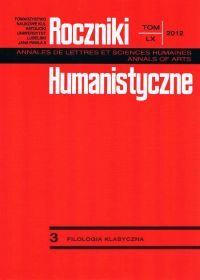Filozofowie i filozofia w Geografii Strabona z Amasei
Abstrakt
Strabo of Amasia in his Geography often mentions philosophers, under whose name he includes the thinkers related to particular schools as well as Indian and Egyptian priests, Celtic druids, and Homer—the only poet referred to in the Geography as philosopher. In the narrower meaning, Strabo gives the name of philosophers only to the first group, but in the broader sense he includes all universal scholars, in accordance with the Stoic understanding of philosophy; the introduction to the Geography reflects also a general view of the Stoics that ethics stems from the natural sciences. The remarks in the introduction which concern philosophy serve also Strabo’s polemical goals in his dispute with Eratosthenes of Cyrene about the credibility of Homeric epics as a source of geographical and historical knowledge: Eratosthenes, a Platonist under the influence of Academic skepticism, claims that poetry aims at entertaining and not at educating, whilst Strabo, a convinced Stoic, takes poetry to be the first form of philosophy which allows for delivering the truth about the world to unlearned recipients. Philosophical differences of Eratosthenes and Strabo are also connected with their different perception of the role of particular disciplines—Eratosthenes separated them from each other, but Strabo, in accordance with the traditional view, united them in service of philosophy, which teaches the art of achieving happiness in one’s life and thus is the most important area of knowledge.
Bibliografia
Chroust A.-H.: Philosophy: Its Essence and Meaning in the Ancient World, „The Philosophical Review” 56 (1947), z. 1, s. 19-58.
Dueck D.: Strabo of Amasia: A Greek Man of Letters in Augustan Rome, London–New York: Routledge 2000.
Erskine A.: The Hellenistic Stoa: Political Thought and Action, Ithaca: Cornell University Press 1990.
Gajda-Krynicka J.: Piśmiennictwo filozoficzne epoki hellenistycznej, w: Literatura Grecji starożytnej, t. II: Proza historyczna – krasomówstwo – filozofia i nauka – literatura chrześcijańska, red. H. Podbielski, Lublin: TN KUL 2005.
Gresens N.: Genres of History in Strabo’s Geography. Praca doktorska, Indiana University 2009, http://gradworks.umi.com/3380153.pdf (dostęp: 20.04.2012).
Jordan W.: Ancient Concepts of Philosophy, London–New York: Routledge 1990.
Kim L.: Homer between History and Fiction in Imperial Greek Literature, Cambridge: Cambridge University Press 2010.
Long A.A., Sedley D.N.: The Hellenistic Philosophers, t. 1: Translations of the Principal Sources, with Philosophical Commentary, Cambridge–London–New York–New Rochelle–Melbourne–Sydney: Cambridge University Press 1987.
Long A.A.: Stoic Studies, Cambridge–New York–Melbourne: Cambridge University Press 1996.
Pacewicz A.: Strabon, Geografia XVII 1, 36, „Acta Universitatis Wratislaviensis. Classica Wratislaviensia” 2007, nr 27 (2972), s. 89-95.
Pfeiffer R.: History of Classical Scholarship: From the Beginnings to the End of the Hellenistic Era. Oxford: Clarendon Press 1968.
Platon: Dialogi, tł. W. Witwicki, t. I-II, Kęty: Wydawnictwo Antyk Marek Derewiecki 2005.
Roseman Ch.H.: Reflections of Philosophy: Strabo and Geographical Sources, w: Strabo’s Political Geography: The Making of a Kolossourgia, red. D. Dueck, H. Lindsay, S. Pothecary, New York: Cambridge University Press 2005.
Schenkeveld D.M.: Strabo on Homer, „Mnemosyne”. Fourth Series 29 (1976), z. 1, s. 52-64.
Sihler E.G.: Strabo of Amaseia: His Personality and His Works, „The American Journal of Philology” 44 (1923), z. 2, s. 134-144.
Solmsen F.: Eratosthenes as Platonist and Poet, „Transactions and Proceedings of the American Philological Association” 73 (1942), s. 192-213.
Stoicorum veterum fragmenta [skrót: SVF], t. II-III, red. I. ab Arnim, Studgardt: B.G. Teubner 1964.
The Geography of Strabo, tł. H.L. Jones, t. I-VIII, London–Harvard: William Heinemann Ltd., Harvard University Press 1923 oraz wznowienia: 1959-1969.
Suetonius, tł. J.C. Rolfe, t. II, London–Harvard: William Heinemann Ltd., Harvard University Press 1914.
Swieżawski S.: Dzieje europejskiej filozofii klasycznej, Warszawa–Wrocław: Wydawnictwo Naukowe PWN SA 2000.
Thorsrud H.: Arcesilaus and Carneades, w: The Cambridge Companion to Ancient Scepticism, red. R. Bett. Cambridge-New York: Cambridge University Press 2010.
Wróbel M.: Strabon o Arystotelesie i jego dziełach, „Acta Universitatis Wratislaviensis. Classica Wratislaviensia” 1996, nr 20 (1877), s. 37-50.
Copyright (c) 2012 Roczniki Humanistyczne

Utwór dostępny jest na licencji Creative Commons Uznanie autorstwa – Użycie niekomercyjne – Bez utworów zależnych 4.0 Międzynarodowe.





